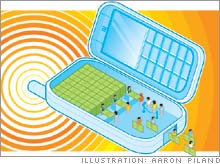|
Turning your cell phone into a wallet Mobile commerce has finally arrived, with PayPal, MasterCard, Cingular, and a host of startups fighting over the $24B cash-on-cell-phones market.
(Business 2.0 Magazine) -- When Amazon.com engineer Gaurav Oberoi went on vacation to Europe with friends in 2004, they decided not to worry about who paid for what until after the trip. But that meant recording expenses in a paper notebook, typing the numbers into a spreadsheet, and e-mailing it back and forth. "Splitting bills can be a relationship killer," Oberoi says.
He knew there had to be a better way. So he and fellow engineer Chuck Groom quit Amazon.com (Charts) to build a company that tracks informal loans - a market the two dubbed "social money" - via cell phone. Their Seattle startup, BillMonk, launched in January. Its free service sends reminders about what is owed to whom; BillMonk expects to cash in by charging for premium memberships that let you settle up by phone. More than 7,000 users have signed on already. "The economy of informal debts is huge," Oberoi says. "All we're doing is making this invisible market visible, then monetizing it with payment options." The market is indeed huge. An estimated $103 billion of social money - think split dinner checks and cab fares - is traded every year. And BillMonk isn't the only company poised to take a piece of it. A growing group of startups and established players like PayPal, MasterCard (Charts), and Cingular are betting that the cell phone is about to become king of small, on-the-go, cashless transactions. Total worldwide mobile payments will reach $24 billion this year and $55 billion by 2008, according to technology analysts at Celent. Deja Vu all over again You're right if you think you've heard the idea before: Mobile commerce was indeed a buzzword in the late '90s. But as with a lot of ideas from that era, its time may have finally come. "There was a lack of standards in this country, and the devices weren't quite ready," says Dan Schatt, a senior analyst at Celent. "But the stars are finally aligning. This will happen a lot faster than most people realize." PayPal has a leg up in the social money game. In April it launched PayPal Mobile, a free service that lets PayPal users send as little as a penny (and as much as $1,000) to each other by text message and buy from merchants who display a special text-to-buy number. "Mobile payments will be an exploding market," predicts Kevin Dulsky, senior director at PayPal Mobile. He won't say how many users have signed up so far, but PayPal itself has an installed base of more than 100 million. It isn't short of rivals. Obopay, a startup in Redwood City, Calif., lets you transfer money via a downloadable application on a cell phone and then access that money at any ATM using a special debit card. Obopay scored $10 million in first-round venture funding and has alliances with MasterCard and Cingular. Redmond-based TextPayMe lets users send a short code along with the recipient's phone number. The sender then receives a call that confirms the transaction. Billmycell users in San Diego can pay cab drivers and purchase e-tickets via cell phones. MyTango, a Menlo Park, Calif., startup backed by Atrium Capital, lets users pay for take-out food with their phones. Then there's a technology called near-field communication, or NFC, which offers secure short-range payment between phones and payment terminals. Nokia (Charts) already has an NFC phone on the market, and this year MasterCard and Visa are beginning NFC trials. "People carry their phone more often than their wallet these days," says Richard Fletcher, head of MasterCard's mobile wireless group. Motorola (Charts) is bringing its own payment system and NFC handset to market by early 2007. Research firm In-Stat expects as many as 25 million NFC-enabled phones to be on the U.S. market by 2011. In the meantime, a lot of companies will get rich providing the infrastructure. Vivotech, based in Santa Clara, Calif., has shipped more than 160,000 NFC readers since it started selling them 18 months ago. How many more it sells depends on how fast consumers buy into the phone as a hassle-free solution for, say, settling up a European vacation. ____________________________ Related: Going from good, to the MGM Grand. More retirees launch startups. |
|

